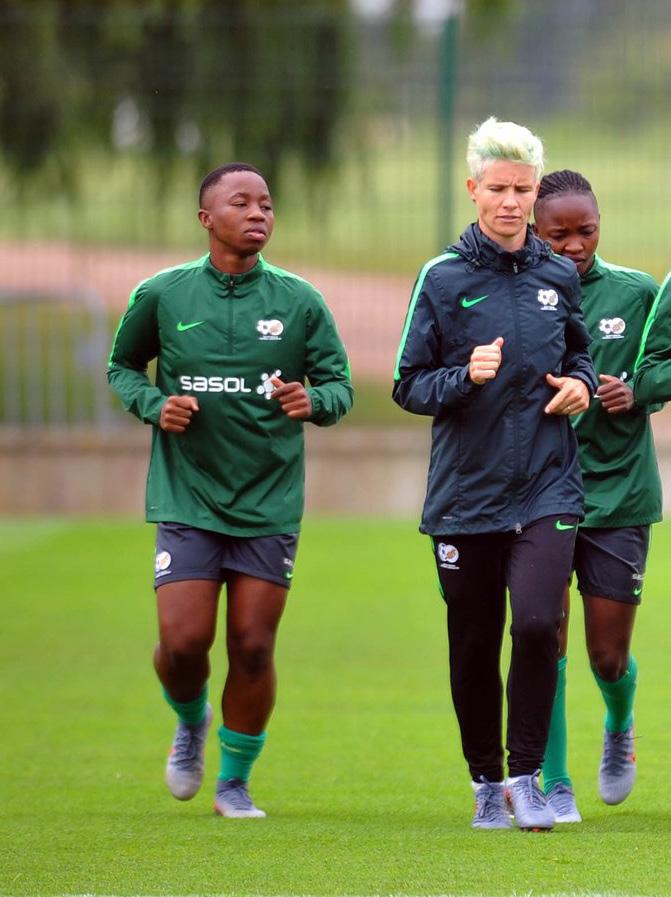
4 minute read
TALKING POINT WOMEN’S FOOTBALL
BY SINETHEMBA MBATHA
Female footballers often face more challenges compared to their male counterparts. From inequality in wages to lack of support from football boards and constantly being slammed and made fun of by individuals who are not supporters of the women’s game. This has been going on for years, and these are just some of the challenges female footballers have to constantly fight.
For many years women national teams across the world have been fighting for equality, with many claiming that they are underpaid compared to men. The reigning world champions, the United States women’s football team is one of the leading teams in the fight for equality, however their fight recently suffered a huge blow after their bid for equal pay was dismissed by a court. After this announcement, I went through heartbreaking responses from mostly men who ridiculed women’s football stating: “they do not deserve equal pay because they will never be equal to men”.
The above statement is proof for women there are many challenges they have to overcome in order to be recognised in the same way as their male counterparts. Some of these challenges include nature which they cannot control. This is one of many articles aimed at highlighting different challenges women footballers face but do not converse about them. Did you know that a women’s monthly menstrual cycle is a natural female occurance – which cannot be controlled – has a negative impact on their sporting performance?
As a woman writing this piece, I can assure you that a woman’s body experiences many hormonal fluctuations leading up to, and during their menstrual cycle. This may differ from woman to woman. However, some of the common
symptoms include, but not limited to: cramps, bloating, headache and a decrease in strength for most. In a recent study conducted by Dr. Laura Forest and Professor Chris Easton of the University of the West of Scotland in which female rugby players participated in on menstruation; it was discovered that indeed symptoms during the menstrual cycle does negatively affect sporting performance. The study further touched on the negative psychological effects linked to female


athletes’ menstrual cycles. This included constant worry about heavy bleeding, clothes to wear during training, distraction, lack of focus on the task at hand and concentration which affects their productivity and overall performance.
I took it upon myself to conduct a similar study on female footballers in South Africa. I discovered the negative effects of menstruation locally are similar to most female athletes across the globe. Some footballers stated they even have to take a break from their regular exercise routines during that time of the month due to abdominal pain becoming unbearable. Others did state they were forced to push through the pain and fatigue in order to avoid not being part of the team selection.
Speaking to one of the local women’s team coaches – who herself used to be a player – tshe had this to say about the impact of period pains on her players: “period pains are the worst. During my days as a player I used to struggle with severe cramps and I had to find ways to deal with it. Medication helped but on days when I did not have I went running and did tough workouts to try and ease the pain.” She further added that young women she coaches experience the same symptoms and it definitely affects their performances negatively. They experience mood swings, severe pain – which is a challenge because they have to stay away from training – and heavy flow which leads to low self-esteem and insecurities.
“We had a player who struggled with severe cycles to a point of being unable to walk. We had to eventually grant her permission to train alone to do coordination and sharp actions, where her concentration was not lengthy.”
One local footballer commented: “Menstruation cycle ruins everything for a player especially if it occurs during a time when you have prepared yourself and are ready to give it your all in training and during games. It tends to control you physically and emotionally. The pains become unbearable and medication has its own side effects which have a negative impact on performance. It is sad that this is nature and we can’t do much about it”.
This is just one of the challenges that many had no idea about. I hope it sheds some light on this unpopular, often ignored and highly pertinent topic to help people understand what women footballers deal with, rise above it all and perform. What the women’s game needs now more than anything, is support in their fight for recognition and equal treatment instead of discrimination because of gender. Ù






